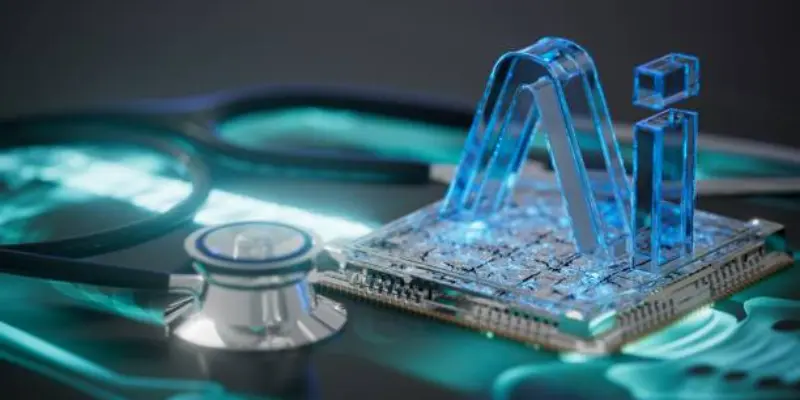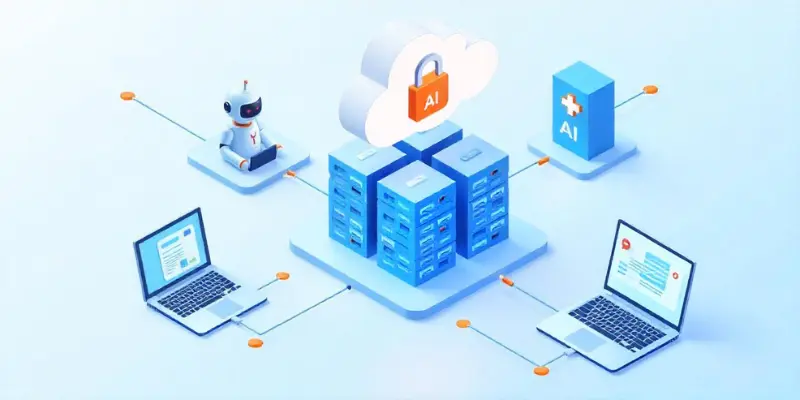AI in Medical Records: A Step to Secure and Accurate Data Handling
Published: 25 Mar 2025
Medical records are the backbone of healthcare. They store patient history, diagnoses, treatments and test results. But managing these records manually can be slow, error-prone and overwhelming for hospitals and clinics. This is where AI is making a big difference.
AI is transforming medical record-keeping by automating data entry, reducing errors and improving accessibility. Doctors can now find patient information faster, hospitals can streamline workflows and patients get better care with accurate records.

But how exactly does AI help? What are its benefits and challenges? And what does the future hold for AI in medical records? In this article, we will explore everything you need to know about AI’s role in medical record management. Let’s get started!
What Are Medical Records?
Medical records are files that store a patient’s health information. These records help doctors track medical history, treatments and test results.
Types of Medical Records
There are different types of medical records, including:
- Electronic Health Records– Digital versions of patient records stored in hospital systems.
- Patient History– Details about past illnesses, surgeries and treatments.
- Test Results– Reports from blood tests, X-rays, MRIs and other diagnostics.
- Prescriptions– Medications prescribed by doctors.
- Billing & Insurance Records– Payment details and insurance claims.
Challenges With Traditional Medical Records
For years, hospitals used paper-based records. This method had many problems:
- Time-Consuming– Doctors and nurses had to search through files manually.
- Prone to Errors– Handwritten notes could be misread and lead to mistakes in treatment.
- Difficult to Share– Transferring patient records between hospitals was slow and complicated.
How AI Is Transforming Medical Records
AI is making medical records smarter, faster and more accurate. It helps doctors, nurses and hospitals to manage patient data easily. Here’s how AI is changing medical records:

1. Automating Data Entry
Doctors spend a lot of time entering patient details into systems. AI helps by:
- Converting handwritten notes into digital records.
- Extracting important details from reports automatically.
- Reducing manual work, so doctors can focus on patients.
💡 Example: AI-powered speech recognition tools allow doctors to dictate patient notes and the system automatically transcribes them into text.
2. Improving Accuracy
Mistakes in medical records can be dangerous. AI helps by:
- Identifying errors in prescriptions or test results.
- Detecting missing information and suggesting corrections.
- Reducing duplicate records, preventing confusion.
💡 Example: AI alerts doctors when it finds conflicting medication history in a patient’s file.
3. Speeding Up Record Retrieval
Doctors often need to find patient history quickly. AI-powered search tools help by:
- Organizing records in easy-to-find formats.
- Suggesting relevant information based on patient symptoms.
- Allowing voice-based search for faster access.
💡 Example: A doctor can say, “Show John’s latest blood test results,” and AI retrieves them instantly.
4. Enhancing Security & Compliance
Patient data is sensitive. AI improves security by:
- Detecting unauthorized access and alerting hospitals.
- Encrypting data to prevent leaks or cyberattacks.
- Ensuring hospitals follow legal data protection rules.
💡 Example: AI flags unusual login attempts and blocks unauthorized users from accessing medical records.
Also Read: AI Case Studies in Healthcare which covers real world examples of AI’s role in healthcare.
AI Tools Used in Medical Records
AI relies on smart tools to manage medical records quickly and accurately. These tools help in organizing patient data quickly without wasting time. Here are the key AI technologies making a difference:
a. Natural Language Processing (NLP)
NLP allows AI to understand and process human language. It reads and organizes medical records by:
- Converting doctor’s handwritten notes into digital text.
- Extracting important details from medical reports.
- Summarizing long patient histories into key points.
💡 Example: AI can scan a doctor’s note and highlight symptoms, diagnosis and treatment plan automatically.
b. Machine Learning Algorithms
Machine learning helps AI to manage patterns in medical data. It improves medical record-keeping by:
- Predicting missing details in patient files.
- Organizing records based on symptoms, treatments or test results.
- Detecting errors in billing and insurance claims.
💡 Example: AI notices that a patient’s allergy information is missing and suggests adding it before prescribing medication.
c. Chatbots & Virtual Assistants
AI chatbots help patients and healthcare staff by:
- Answering questions about medical records instantly.
- Helping patients schedule appointments and check prescriptions.
- Guiding doctors on record updates using voice commands.
💡 Example: A patient asks a hospital’s chatbot, “When was my last check-up?” The AI quickly retrieves the date from the medical records.
Managing the medical records is the job of medical coders, what does this mean will AI take over medical coding?
Steps to Integrate AI in Medical Records for Better Growth
AI can make medical records faster, more accurate and easier to manage. But hospitals and clinics need the right steps to integrate AI smoothly into their existing system. Here’s how:

1. Choose the Right AI System
Not all AI tools are the same. Healthcare providers should:
- Pick AI software that fits their needs (e.g., data entry, record retrieval, security).
- Ensure it works with existing hospital systems (EHR platforms and databases).
- Select AI solutions that follow healthcare regulations (HIPAA and GDPR).
Tip: Look for AI platforms designed specifically for healthcare, like IBM Watson Health or Google’s Med-PaLM.
2. Train Healthcare Staff
Doctors, nurses and admin staff need to know how to use AI tools properly. Training should include:
- How to enter and retrieve records using AI-powered systems.
- How to check AI suggestions for accuracy.
- What to do if AI makes mistakes in data processing.
Solution: A hospital can organize monthly AI training sessions for helping theur staff to use AI effectively.
3. Improve Data Quality
AI works best with clean and organized data. To ensure accuracy:
- Remove duplicate or outdated records.
- Standardize how patient information is recorded.
- Use AI to identify missing details and fix errors.
Example: AI can alert staff if a patient’s allergy history is missing before a prescription is issued.
4. Strengthen Security & Compliance
Patient data is sensitive. AI should be used responsibly by:
- Encrypting medical records to prevent unauthorized access.
- Using AI-powered fraud detection to spot unusual activity.
- Ensuring AI systems comply with privacy laws and hospital policies.
Tip: Hospitals should regularly update AI security features to prevent cyber threats.
5. Monitor & Improve AI Performance
AI needs regular monitoring to stay effective. Hospitals should:
- Track how AI improves record-keeping efficiency.
- Get feedback from doctors and staff to refine AI usage.
- Update AI systems regularly to keep up with new advancements.
Example: A hospital can review AI-generated reports every month to check for errors and improvements.
By following these steps, healthcare providers can integrate AI smoothly into medical records, making patient care faster, safer and more efficient. Up next, let’s explore the challenges and concerns of using AI in medical records.
Advantages and Disadvantages of AI in Medical Records
AI has made medical record-keeping faster, more accurate and efficient, but it also has some challenges. Let’s look at the key benefits and drawbacks.
Advantages of AI in Medical Records
Here are the benefits of Using AI in Managing Medical Records;
| Pros |
|---|
|
Disadvantages of AI in Medical Records
Here are the most common drawbacks people face while using AI in Medical Records;
| Cons |
|---|
|
Do you also want to know, Should AI bed used in Healthcare?
The Future of AI in Medical Records
AI is continuously upgrading every field in healthcare and its role in medical records will only grow. In the future, we can expect even more AI automation, accuracy and security in patient data management. Here’s what’s coming next:
A. Fully Automated Medical Records
- AI will handle data entry, updates and organization with minimal human effort.
- Doctors will be able to speak or type symptoms and AI will generate structured medical records instantly.
B. AI-Powered Predictive Insights
- AI will analyze medical records to predict future health risks.
- It will suggest preventive treatments based on patient history.
C. Blockchain for Enhanced Security
- AI and blockchain will work together to make medical records tamper-proof.
- Patients will have more control over their health data and they can decide who can access it.
D. AI-Powered Voice Assistants for Doctors
- AI assistants will listen to doctor-patient conversations and automatically update records.
- This will reduce paperwork and let doctors focus on patients.
E. Seamless Data Sharing Between Hospitals
- AI will help different healthcare facilities share records instantly without errors.
- Patients will no longer need to carry paper reports when switching hospitals.
Conclusion
AI is revolutionizing medical records by making them faster and easier to manage. It helps the doctors to find patient history instantly, reduces paperwork and improves overall healthcare efficiency. With AI-powered automation, hospitals can focus more on patient care rather than administrative tasks. To make the most of AI in medical records, hospitals must train staff, ensure data security and monitor AI performance regularly.
Looking ahead, AI will continue to evolve and bring even more advancements—from predictive analytics to blockchain security and voice-assisted medical records. The key is to embrace AI responsibly and use it to create a smarter, safer and more efficient healthcare system.
💡 What’s next? If you are interested in how AI is making changes in other areas of healthcare, check out our latest insights on AI Growth in Healthcare!
Related Queries About AI in Medical Records
Here are frequently asked questions about AI’s Role in Medical Records
AI helps by automating data entry, reducing human errors and making patient records easier to access. It quickly scans and organizes records which allows doctors to find patient information in seconds. This speeds up treatment decisions and improves healthcare efficiency.
Yes, but hospitals must ensure strong security measures. AI uses encryption and fraud detection to protect patient data. However, healthcare providers must follow privacy laws like HIPAA to prevent unauthorized access.
No, AI assists doctors and medical staff but doesn’t replace them. It automates routine tasks but human oversight is needed to check accuracy. Doctors make the final decisions about patient care.
Some challenges include high costs, data privacy concerns and the need for staff training. AI systems must be updated regularly to stay accurate. Also, hospitals must ensure AI works well with existing healthcare software.
AI scans records to detect missing information, duplicate entries or incorrect details. It alerts staff to fix errors before they affect patient care. This reduces the risk of misdiagnoses and medical mistakes.
Yes, but adoption is slower due to cost and training requirements. Many small clinics use basic AI features like voice-to-text transcription and data organization. As AI becomes more affordable, more small healthcare providers will integrate it.
Yes, AI analyzes patient history to identify patterns and predict potential health risks. It can alert doctors if a patient is at risk of diabetes, heart disease or other conditions. However, final diagnosis and treatment decisions still require human judgment.
AI protects medical records with encryption, fraud detection and automated access control. It can detect unusual activity like unauthorized access attempts. This helps in preventing cyber threats and data breaches.
Yes, AI is helping transition healthcare to fully digital records. Many hospitals are already using AI-powered Electronic Health Records to replace paper files. This makes medical data easier to store, retrieve and share securely.
AI will continue to improve automation, predictive analytics and data security. Future advancements may include voice-assisted record updates, blockchain integration and smarter AI assistants. These innovations will make healthcare more efficient and patient-centered.





